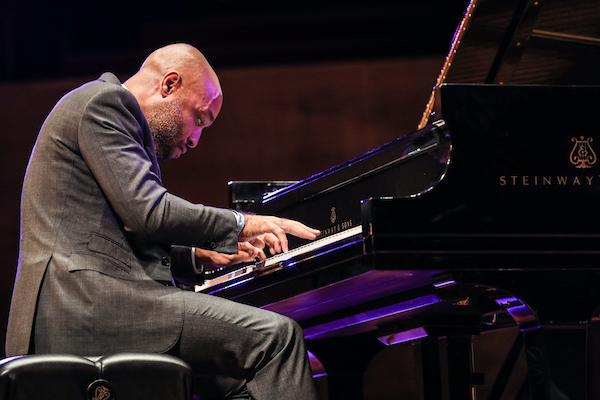Jan 13, 2026 2:09 PM
More Trump-Kennedy Center Cancellations
The fallout from the renaming of the John F. Kennedy Center for the Performing Arts to include President Donald…

The Vagabond merges Aaron Diehl’s jazz background with his increasing interest in the classical world, in part stemming from his work with composer Philip Glass.
(Photo: Mark Sheldon)In late January, Aaron Diehl elegantly delivered an intimate solo-piano show in front of a packed house at Mezzrow in New York’s Greenwich Village.
Joking that the space was almost like his living room, Diehl eased into the set with a Clare Fischer swing tune, segued into calm balladry with deep crevices of lyrical reflection on Gordon Jenkins’ “Goodbye” and then pounced on the keys in a joyful frolic through Hank Jones’ “Odd Number.” Diehl used the stylistically diverse tunes to create a gentlemanly confluence of flowing expression. He then revealed an audience-participation game of requesting segments of songs from a list of 17 pianists. Diehl showed his jazz prowess, emulating such greats as Jelly Roll Morton, Art Tatum and Teddy Wilson, but then stopped short on an audience member’s request for Herbie Nichols. “Whoa, we’ll have to save that for another day,” he said with a laugh.
After offering a tasty original, “Little Branch,” based on the local Seventh Avenue South speakeasy, and a moving rendition of Thelonious Monk’s “Ruby, My Dear,” Diehl slid easily into the classical music zone and quipped, “It all goes back to Bach.” He finished the set with a special recognition to the renowned modern classical composer Philip Glass, putting his jazz touch on the master’s “Étude No. 16.” Glass, who has been mentoring and touring with Diehl since 2014, was in the house, no doubt admiring how this rising jazz star was able to advance his distinctive voice in another musical world.
Ten days later at the boisterous social house Norwood Club, Diehl sat down with DownBeat to talk about his new album, The Vagabond, his third for Mack Avenue. Like his show at Mezzrow, the 11-track recording illustrates how Diehl gracefully melds two worlds, merging the improvisational spirit of jazz with the compositional intricacies of Western classical music. Leading a trio with bassist Paul Sikivie and drummer Gregory Hutchinson, he offers seven originals, such as the beautiful melody “Park Slope” and the playful “Kaleidoscope Road,” plus works by jazz masters Sir Roland Hanna (“A Story Often Told, Seldom Heard”) and John Lewis (“Milano”). The program also includes two classical pieces: a romping contrafact on Russian composer Sergei Prokofiev’s “March From Ten Pieces For Piano, Op. 12” and one of Glass’ more challenging piano works, the étude Diehl played at Mezzrow.
Instead of clumsily mashing together multiple genres, Diehl has developed an organic, sophisticated approach. “I try not to think of my music in terms of style, especially these days,” he said. “In my first lesson with Fred Hersch a few years ago, he directed me to lose the idea of stylization. Play less stylized, he told me, and play more with a focus on who is Aaron Diehl. Through the influence of many different pianists, I’m starting to think less about compartmentalizing and more about using the knowledge I’ve acquired up to this point—to be expressive of that and be able to have a conversation with my band members not about style but about what we’re all doing together.”
Building on his previous releases—The Bespoke Man’s Narrative (2013) and Space Time Continuum (2015)—the new album broadens Diehl’s exploration of piano in the jazz-classical nexus. It’s an aesthetic journey that seems to be leading to an “indeterminate destination.” He said, “It’s not as much expressing where I am now, but it’s more about seeing me in motion. I’m trying to define things on my own terms. Ever since I got the opportunity to play Gershwin with the New York Philharmonic, it resurrected some deep-seated interest not just in classical music but in its practice and performance.”
Diehl, 34, has earned a reputation as one of the most important jazz players of his generation. He seems to be more focused on his artistry, though, than any squabbles within the industry. “I see the jazz scene today as very disjointed,” he said. “It’s very rich but also very polarized. There are cliques and egos defining what is and what is not jazz. I guess that’s always been the case. It’s a human need to define and clarify what you’re experiencing, but I see that there’s so much more to playing with nuance. Still, I find jazz musicians to be endlessly fascinating to be around, to share ideas and have conversations.”

Belá Fleck during an interview with Fredrika Whitfield on CNN.
Jan 13, 2026 2:09 PM
The fallout from the renaming of the John F. Kennedy Center for the Performing Arts to include President Donald…

Peplowski first came to prominence in legacy swing bands, including the final iteration of the Benny Goodman Orchestra, before beginning a solo career in the late 1980s.
Feb 3, 2026 12:10 AM
Ken Peplowski, a clarinetist and tenor saxophonist who straddled the worlds of traditional and modern jazz, died Feb. 2…

The success of Oregon’s first album, 1971’s Music Of Another Present Era, allowed Towner to establish a solo career.
Jan 19, 2026 5:02 PM
Ralph Towner, a guitarist and composer who blended multiple genres, including jazz — and throughout them all remained…

Rico’s Anti-Microbial Instrument Swab
Jan 19, 2026 2:48 PM
With this year’s NAMM Show right around the corner, we can look forward to plenty of new and innovative instruments…

Richie Beirach was particularly renowned for his approach to chromatic harmony, which he used to improvise reharmonizations of originals and standards.
Jan 27, 2026 11:19 AM
Richie Beirach, a pianist and composer who channeled a knowledge of modern classical music into his jazz practice,…